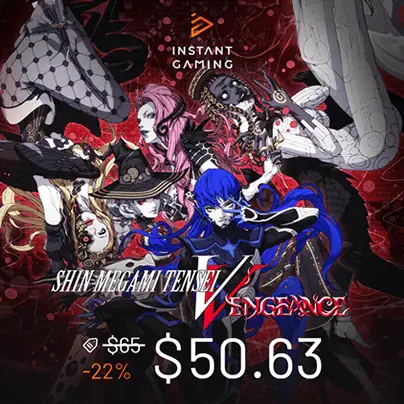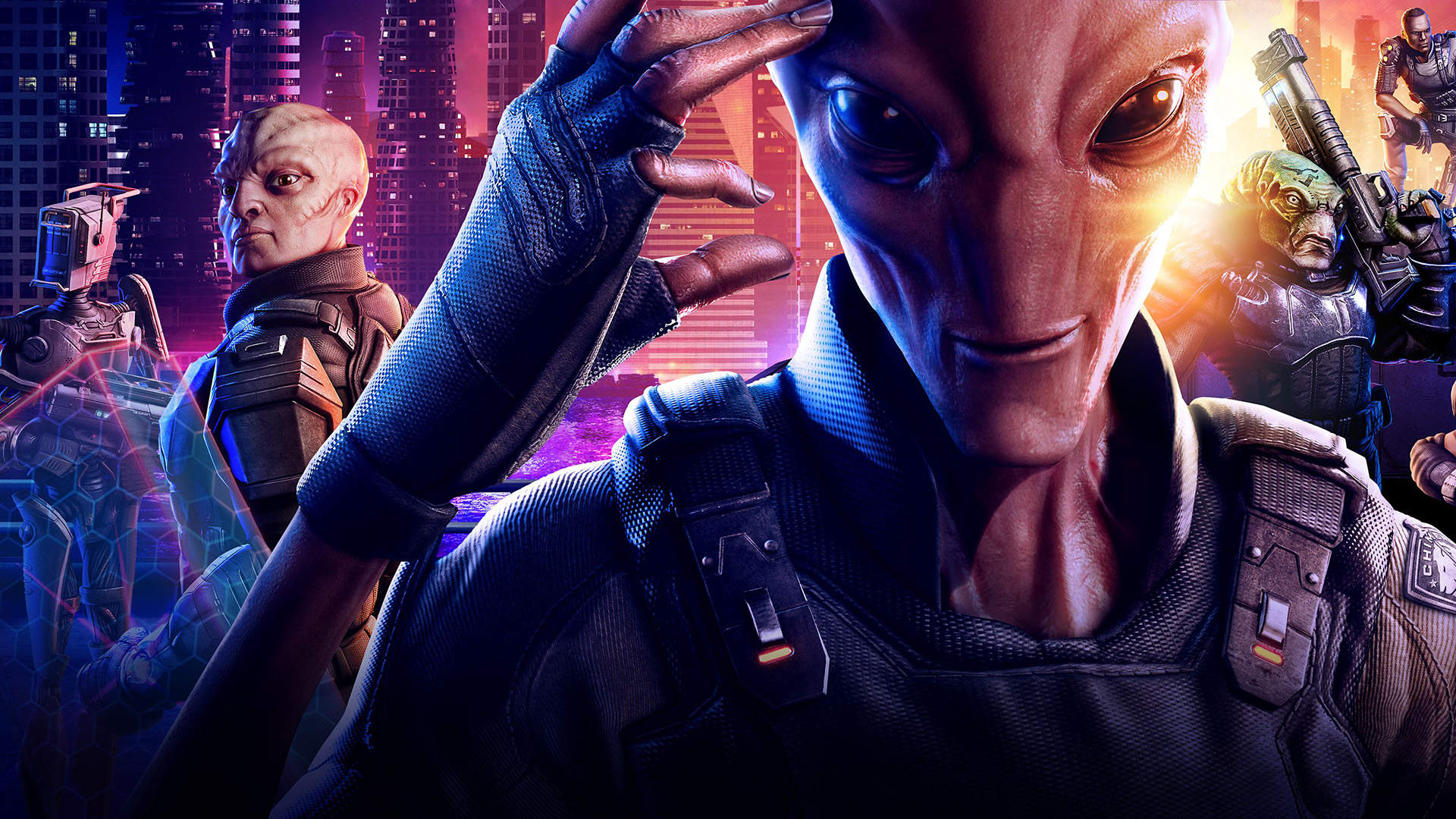It’s been a tough battle, but it seems you’ll manage alright. Probably the last baddie remains—you just have to find him. The squad spreads out, combing the area cautiously and methodically. You feel it—he’s close. Any turn now can be the last. You lose concentration for a second and misclick, sending Whisper, one of your best soldiers, to the middle of a plain field with no cover. Of course, this is exactly when you find the last enemy—he’s a nasty one—squishy but deadly accurate—you can’t allow him an opportunity to shoot.
Tough luck—Whisper has barely enough APs left for one single shot. She’ll have to hit the bastard, or he’ll definitely get her next turn. Whisper has been with you since the very beginning—she’s tough and experienced, and your squad will never be the same without her. It’s a 95% chance she’ll kill the enemy, but you begin to sweat—you know precisely how probability works. You hesitantly take your time. A triumph or a tragedy—a sole mouse click and a stroke of luck will determine the outcome.
It doesn’t matter, though—you already lost a couple of hours ago while misprioritizing your research, and now it’s just a matter of time before the technological handicap will snowball you out of any hope of winning the long game.
There’s a specific sub-genre of strategy games that combine tactical depth with a dynamic narrative while remaining separate from wargames or tactical RPGs. The uniqueness of said approach is not easy to put into words, but the concept of XCOM-like is understood by many on a purely visceral, experiential level. When you play a new XCOM-like game, you know what’s coming—dozens of hours filled with dramas, traumas, blunders, facepalms, curses, and occasional triumphs. Your first playthrough will probably end in a disastrous defeat, but it will be worthwhile. Moreover, the audience of such games is never satisfied—they are always happy to prolong and intensify the suffering with intricate mods that make XCOM-likes even more challenging.
Indeed, something more than just masochistic tendencies makes people play and enjoy these games. Understanding comes with definition. So let’s define a typical XCOM-like—let’s see what makes it tick, what main gameplay aspects construct the core of this genre, and most importantly, what cultural impact potentially can be achieved with these powerful mechanics.
I’d argue that the primary goal of any XCOM-like is to make the player feel the existential struggle, to widen the scope of conflict—not just between handicapped side A and overpowered side B, but between handicapped side A and everything else, including an overpowered side B, macromanaging of the resources, seeming unpredictability of processes, and the rest of game mechanics that work in tandem to give the player a feel of constant struggle. But while unleashing all the hellhounds, developers should also make the game playable and enjoyable—even if there is a chance that most playthroughs won’t end in a victory.
I’ll sum it up in four critical aspects. Asymmetry and uncertainty—for making the player’s life as unbearable as possible on the one side; sentiment and manageability—for hooking the player enough to not fall into despair and drop the game, on the other.
Asymmetry
A perfect balance between the warring parties is essential for a successful competitive strategy game like Starcraft. It’s the complete opposite of existential struggle that, by definition, has to be pretty unfair. Therefore, merciless XCOM-like games handicap their players with no remorse. You are always outnumbered and outgunned. A squad-based system is imperative to keep the size of your force in check. The exact quantity of combatants in the squad can be 6, like in XCOM 2 or 12, like in Battle Brothers—it’s not important as far as the player’s squad is limited, while there are no such limitations for an adversary.
The arms race should be unwinnable. No matter what the player does and how they perform, the enemy will always be more technologically advanced and wield more firepower in the battles. Technical unbalancing is the key, but also enforcing the compromise mentality is essential to limit the player’s feeling of progress and power accumulation. By this, I mean that you can never have all the bonuses simultaneously and must always compromise between gains and forfeits. For example, Enemy Within doesn’t allow you to combine genetic engineering and robotic augmentation in the same unit. The same rule should be applied to all player’s decisions—where to travel, what to research, whom to recruit, etc.
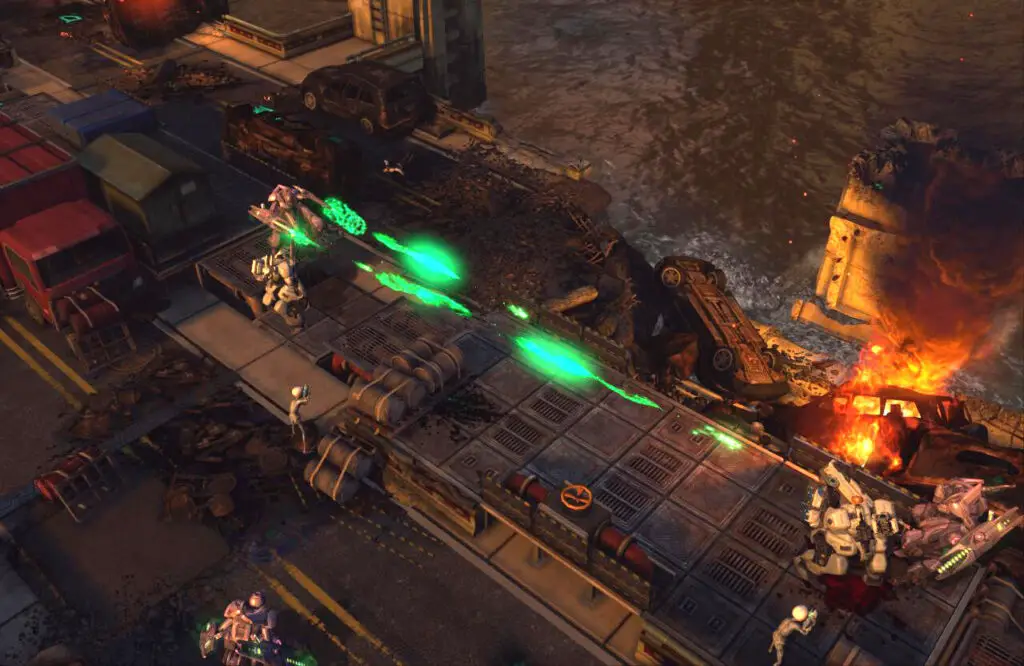
Obscuring the enemy’s progress and presenting multiple adversaries is also essential for building asymmetry. In Jagged Alliance 2, Deidranna’s forces are omnipresent and unlimited—they come out of nowhere, and no matter how many are killed, new ones will come until you kill the dictator herself. Also, some neutral enemies aren’t involved in the game’s main conflict—bloodcats and alien underground bugs.
Uncertainty
Existential struggle implies a lack of control. An ant, carried away by a swift current, fights for its life by doing its best, but in no way it controls the situation. Uncertainty prevents the player from fully controlling what’s happening in the game.
Of course, the most vital tool to enforce uncertainty is randomness. The player cannot be sure if the next shot will hit the target, as well as it’s unknown when or where the enemy will attack next. It’s even better when the randomness is built on non-cumulative probability—when the game doesn’t care whether you’ve missed three times in a row, it will still calculate your next shot independently and won’t give you any slack. Non-cumulative probability (along with negativity bias) is to blame when it seems that a 95% chance is not different from a 50% chance.
An official X-Com: UFO Defense manual contains a tutorial section that demonstrates the level of systemic uncertainty this game possesses:
When even a tutorial section in the official manual can’t predict the outcome of one of the game’s sequences—it’s pretty indicative of the game’s design priorities and overall philosophy.
The consequences of a player’s decisions should also not be obvious, whether they have an immediate or delayed effect. A tactical blunder can lead to the squad mate getting wounded or even killed, while a strategic miscalculation can handicap you even more in the late game.
The point is that as a player, your chances to predict outcomes and consequences of your decisions and the game events, albeit growing with experience, still retain a high level of uncertainty.
As stated previously, along with dropping the player to the bottomless pits of despair, it’s essential also to provide a ladder for the player to climb out. Or else the longevity of the player’s interest can limit itself to mere minutes. What makes an original X-Com still playable by a loyal and sizeable community? Of course, there are mods, but they mostly tweak the details while retaining the kernel principles intact. Sentiment and manageability— these two pillars keep any XCOM-like enjoyable while balancing the asymmetry and uncertainty.
Sentiment
Emotional hooks are often stronger than mechanical ones. If you’re engaged with the story or feel a certain bond with a specific character, your durability in the face of mechanical challenges dramatically improves. That’s why XCOM-likes invest so much into squad mates’ individuality—the scope of customization can vary, but the bare minimum, like a name or somewhat unique appearance, is vital. When your units have names and faces, willingly or not, you memorize and connect with some.
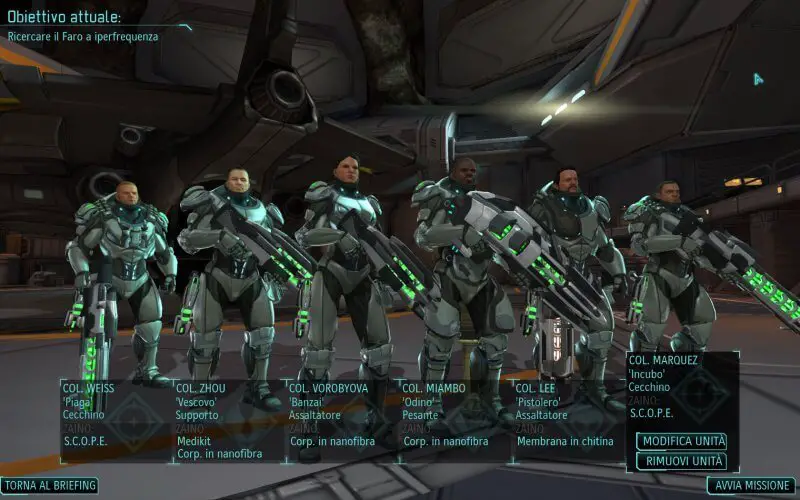
Due to the randomness and unpredictability of the gameplay, little stories emerge—you witness how Ivan survives in the crossfire and give him the nickname “Lucky”; one of the rookies misfires and kills one of your most precious old-timers—the only survivor of the Chryssalid massacre, when most of your squad was wiped out. It’s called emergent narrative—when unexpected contextual stories emerge during a play.
While the game’s overarching plot—in other words, an embedded narrative—gives a vital context for the primary conflict of the game and guides the game’s narrative flow, the main source of emotion should be the emergent narrative. Thus, every playthrough gets a unique edge, which is essential when lots of fail states, disastrous defeats, and restarts are the planned norm.
Important to note that even if an embedded narrative is impressively branched and written with replayability in mind—it’s still not good enough for XCOM-like because dramatic twists and turns are still pre-planned and can be consciously replicated. The XCOM-like emotional charge has to be seemingly random and impossible to control fully—existential struggle, remember? This is why The Banner Saga, for example, can’t be considered XCOM-like—even if the embedded narrative tells a story of existential struggle, the emergent narrative is almost non-existent because most of the dramatic events and outcomes are based on a pre-planned, albeit branching, story.
XCOM-like is not just about an existential story. It’s mostly about existential tactics.
Manageability
All this chaos of asymmetrical randomness and unexpected gameplay dramas has to be manageable. We’re talking about games, after all, that can be mastered and can be beaten. Again, the exact proportions of chaos and manageability are a matter of the desired message and feel that developers want a game to express. But there is an essential tool for taming the game’s stochasticity—a macro-strategic layer.
A macro-strategic layer is a framing phase of the game—it’s when you build or improve your base, recruit and upgrade your soldiers, research new technologies, manage your resources, etc. Unpredictable outcomes of tactic battles are much more manageable when you have an overarching strategic tool to tweak and play with. For example, a defeat in a tactical battle can be very dramatic but not disastrous—the game is not yet over, and you have a chance to recover!
Conversely, strategic blunders have significant repercussions even if you are a natural tactical genius—this can’t be avoided for the reverse to work. Therefore, the macro-strategic layer has to be a meaningful gameplay mechanic and not merely a decorative vehicle for intensifying the player’s immersion. A meaningful strategic layer is like a riverbed for the currents of myriads of randomnesses that occur in tactical battles—managed correctly, it helps to organize and optimize the existential struggle.
The additional imperative for the manageability of XCOM-likes is the turn-based system of tactical combat or at least some form of time manipulation mechanic. XCOM-like with pure real-time combat will not work as XCOM-like—it will be an entirely different experience with a different focus. Real-time combat is based on the player’s skill and reaction, which creates a far more punishable environment for randomness—therefore, to establish a more or less organic game flow, real-time systems demand a certain level of predictability that is too much for an XCOM-like.
Real-time gameplay is more visually chaotic—it’s suitable for epic spectacles but not so well deals with the sentiment. It’s like an aerial shot in movies—showing scope and magnitude, while turn-based gameplay is a more zoomed-in close-up, focused on nuances and intimacy.
A turn-based system or any other time control mechanic that divides the gameplay into manual planning and automatic implementation phases, like in Phantom Brigade, is imperative for XCOM-like games because it simultaneously improves manageability and increases sentimental charge. Its effect is so prolific within our theoretical scheme that replacing it with a purely real-time system will demand a total rebalance that will result in anything but an XCOM-like game.
But what about X-COM: Apocalypse? The game was initially planned to be fully real-time, and only due to the negative fan reaction was the option of turn-based combat added in the later stages of development. Firstly, the game is a mess—it can be charming and fun, but it’s objectively failed as a continuation of the franchise and, retrospectively, an evident evolutionary dead-end for the X-COM kernel ideas.
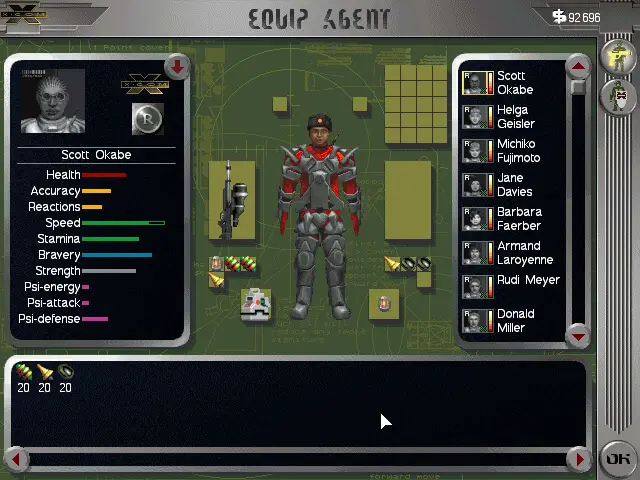
Secondly, real-time combat in this game is easily manipulated, making close-combat enemies practically toothless. Every system can be manipulated, of course, but when the tools for this lay on such a surface layer that you have no choice but to use them, the existential struggle becomes not so existential and not really a struggle.
X-COM: Apocalypse is an exception that proves the rule—real-time tactical battles are poorly suited for XCOM-like games. They can even make an X-COM game non-XCOM-like.
Of course, everything stated above, if singled out, is not unique to XCOM-like games. But when combined and thoughtfully mixed, a niche genre emerges.
When the principles stated above work in tandem, it creates a perfect instrument for conveying messages of, let’s call it, “against-all-odds-ness.” Whether it’s stories about surviving an alien invasion, struggling against the cruel autocracy, or a doomed war against eldritch horrors (Darkest Dungeon is an XCOM-like game—a camera perspective changes nothing)—the common ground is that these stories are of nearly impossible resistance of oppressed against an oppressor. And most importantly—a group struggle, not an individual one (the latter is the domain of action games).
I believe that this particular niche of strategy games can provide meaningful social commentary, especially in today’s world when such struggles are finally getting the spotlight they so gravely need. And no matter the asymmetrical and seemingly impossible manner of fighting the oppression, it’s manageable, and there’s still a chance for success. A cautious optimism is always more culturally impactful than doom-and-gloom pessimism.
Today mainstream gaming consists mostly of non-genre, or more correctly, all-genre-mishmash games that are afraid to convey solid messages and even say anything at all. It’s the reign of kitsch. In these circumstances, niche genres get new chances to shine—after all, they are specified and highly effective combinations of proven tools. XCOM-like mechanics of existential tactics are undoubtedly relevant, and I’m sure their potential is not nearly exhausted.

